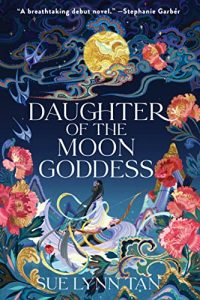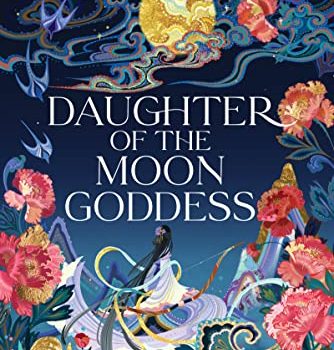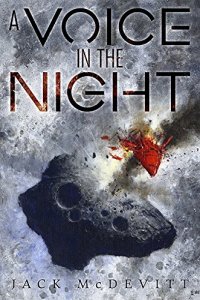Maya C. James Reviews Daughter of the Moon Goddess by Sue Lynn Tan
 Daughter of the Moon Goddess, Sue Lynn Tan (Harper Voyager 978-0-06-303130-2, $27.99, 512pp, tp) January 2022.
Daughter of the Moon Goddess, Sue Lynn Tan (Harper Voyager 978-0-06-303130-2, $27.99, 512pp, tp) January 2022.
Living on the moon for most of her life, Xingyin never imagined more for herself—not growing into her magical powers, fleeing from her home, or risking her life for the kingdom that wants her dead. But after accidentally revealing her existence to the Celestial Emperor, Xingyin embarks on a perilous journey to free her mother Chang’e, the Moon Goddess, and herself from the wrath of the Celestial Empire.
Daughter of the Moon Goddess by Sue Lynn Tan is an epic high fantasy novel about the moon goddess’s powerful daughter, and the lengths she will go to free her mother. After a dangerous attempt to escape the Emperor’s forces, Xingyin works her way into the uppermost echelon of the Kingdom, working for and learning alongside the handsome and surprisingly gentle Prince Liwei. Her odds of success are quite slim. She doesn’t know how to control her powers (at all), has no friends or family, and must disguise her identity even as she grows closer with the Prince. While she eventually masters archery, magic, and alliance-making, she must also guard her heart from two strikingly beautiful and caring men who know nothing of her true identity and purpose.
Fighting tyrants and monsters across the immortal realms should be told in equally epic, heroic prose, and Tan delivers on this tenfold with stunning, vivid detail that matches the setting of Xingyin’s story. Some pages were worth rereading because of the beautiful prose alone.
The main conflict in Daughter of the Moon Goddess stems from Xingyin’s existence. Xingyin’s mother, Chang’e falls in love with the renowned archer Houyi, who saved the world from certain destruction. The immortals of the Celestial Empire thank him by bestowing upon him an immortality elixir. After a series of difficult and dangerous circumstances, Chang’e drinks the elixir instead, and is exiled to the moon by the Celestial Empire for her choice.
Readers unfamiliar with the Moon Goddess tale will quickly become acquainted with the different iterations of her story spoken of in hushed whispers across the Immortal Realms: to many of the immortals, Chang’e may be a criminal, or a woman who made a confusing choice. To the mortals, she’s worshipped every Mid-Autumn festival for the light she brings. But, as the title relays, this is a tale about the daughter of the moon goddess, whose life hangs in the balance because of the past.
I appreciated that Tan gave readers depictions of non-romantic love. Xingyin’s dedication to her mother and her friends is one of the more admirable traits she has. Her loyalty and love for these people in her life was far more compelling than the love triangle between her, Wenzhi, and Liwei, though that did get more interesting in later parts.
Some things seemingly fall in place easily for Xingyin, while others are fought for with every ounce of strength in her. In the first part of the novel, Xingyin fails upwards, frequently saved by men who are attracted to her. My expectations of her fluctuated dramatically in earlier chapters: one moment she miraculously is swept into the palace of Prince Liwei, and the next, she’s fighting mystical monsters soon after her training wraps up. As a result, the first part of the novel felt slightly uneven.
However, Xingyin’s story becomes increasingly interesting the more she grows into her independence and strength. Her friendships deepen, her perceptions grow sharper, and she realizes that the men in her life aren’t really as gentle and loving as she originally thought they were. It was refreshing to see her grow into her confidence, and I looked forward to the passages where she used her wit and talents to get herself out of difficult situations, rather than passing out and being woken up by beautiful, gentle man one, or beautiful, brutal man two (which is about the extent of interest I had in both love interests).
Daughter of the Moon Goddess rests somewhere between YA and adult, the beginning part paced slightly differently than the rest of the novel. Split into three parts, Xingyin’s adventures follow those of an archetypical hero’s journey. From Xingyin’s flight from home on a cloud, to her training and fights with monsters, to the supernatural aid of ancient, magical creatures later on, Tan gives us a hero and epic journey worth following. By the end of the novel, I was surprised to see how far along Xingyin had come, and how much room she had left to grow. Her sacrifices and decision making were that of a determined warrior instead of the scared girl she used to be.
I was surprised but thankful to learn Daughter of the Moon Goddess will be a duology. So many plot lines occurred during the course of the 500-plus pages, that Xingyin’s clear, singular goal became the only constant throughout the novel. Tan’s novel got better and better as it went on, and by the time I finished reading, I was already searching for the release date of the last book in this duology.
Maya C. James is a graduate of the Lannan Fellows Program at Georgetown University, and full-time student at Harvard Divinity School. Her work has appeared in Star*Line, Strange Horizons, FIYAH, Soar: For Harriet, and Georgetown University’s Berkley Center Blog, among others. She was recently long listed for the Stockholm Writers Festival First Pages Prize (2019), and featured on a feminist speculative poetry panel at the 2019 CD Wright Women Writer’s Conference. Her work focuses primarily on Afrofuturism, and imagining sustainable futures for at-risk communities. You can find more of her work here, and follow her on Twitter: @mayawritesgood.
This review and more like it in the February 2022 issue of Locus.
 While you are here, please take a moment to support Locus with a one-time or recurring donation. We rely on reader donations to keep the magazine and site going, and would like to keep the site paywall free, but WE NEED YOUR FINANCIAL SUPPORT to continue quality coverage of the science fiction and fantasy field.
While you are here, please take a moment to support Locus with a one-time or recurring donation. We rely on reader donations to keep the magazine and site going, and would like to keep the site paywall free, but WE NEED YOUR FINANCIAL SUPPORT to continue quality coverage of the science fiction and fantasy field.
©Locus Magazine. Copyrighted material may not be republished without permission of LSFF.








